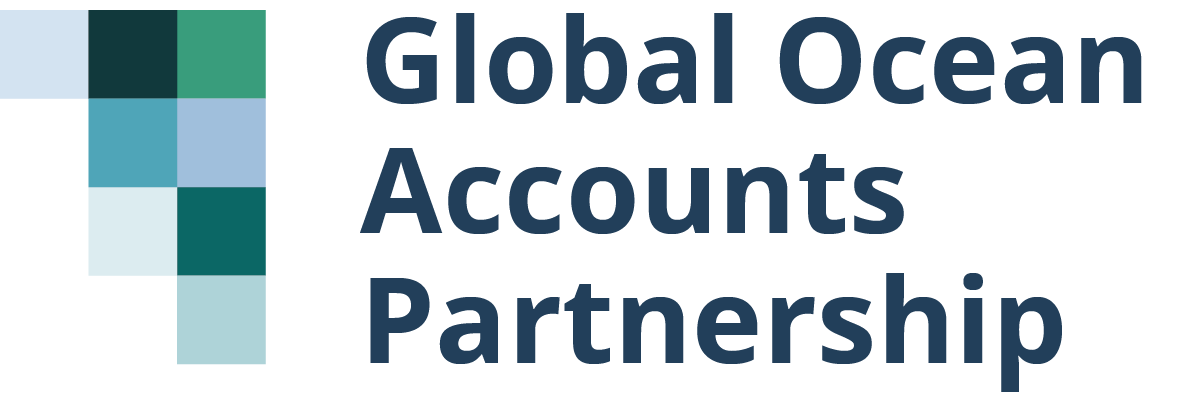Global Ocean Accounts Partnership Panel of Technical Experts

The Global Ocean Accounts Partnership Panel of Technical Experts (the Panel) comprises 21 experts in various aspects of ocean accounting from around the world actively working to improve our understanding of economic and scientific factors affecting the health of the ocean and to generate information that will make more effective action possible. The Panel has two primary missions:
- identify and assess new challenges in ocean accounting that will affect many countries, and
- provide advisory assistance to countries undertaking ocean accounts on technical economic or scientific issues.
The Panel will define the areas for which it will develop guidance, informed by requests and suggestions from national governments and other institutions involved in the compilation or use of ocean accounts. Working groups will be formed for each area and Panel members will prepare short papers and accompanying materials as appropriate.
Panel topics
At the Expert Panel meeting in February, experts formed 10 working groups based on priority topics and relevant expertise. Each Working Group elected a group lead and agreed to draft a concept note to present at the next meeting in April. Priority topics are:
- Communicating ocean accounts to decision makers
- Embedding ocean accounts into integrated ocean management frameworks
- Guidance on the production and use of indicators for Sustainable Ocean Planning (SOP) and/or Blue Economy (BE) planning
- Review of current practice in deriving Ocean Economy Satellite Accounts from National Accounts
- Linking Ocean accounts to blue finance instruments
- Design and develop a conceptual structure for capacity development of OA
- Guidance on data collection and data management: developing an overview of data pipeline from source to the production of accounts
- Challenges and choices related to ecosystem service measurement and the monetary valuation of ecosystem services and assets
- Embedding ocean accounts within blue carbon projects, markets, and other related initiatives
- Embedding social and equity considerations into OA
Technical assistance projects for countries will be identified by the GOAP Secretariat who will work with Panel members to define specific expectations and time frames. Panel members may also identify national projects.
Panel members
Panel Chair, Dr Charles Colgan, Research Director, Center for the Blue Economy (CBE), Middlebury Institute of International Studies
Dr Charles Colgan is a leading expert in the sustainable management of the blue economy with over 20 years experience in compiling ocean economic databases, and economic forecasting. Dr Colgan has collaborated frequently with the GOAP to facilitate international training workshops for ocean accounts. Extended bio in link.
Anthony Dvarskas, Biodiversity Lead for Offshore North America, Ørsted
Anthony Dvarskas has over 15 years experience in environmental-economic accounting and ecosystem services valuation, including with the National Oceanic and Atmospheric Administration, United Nations Statistics Division, and UNESCAP. He has published peer-reviewed articles linking economics with sustainable development and coastal management policy. Extended bio in link.
Carl Obst, Director at the Institute for the Development of Environmental-Economic Accounting (IDEEA)
Carl Obst has over 20 years experience compiling economic data, including as Head of National Accounts at the Australian Bureau of Statistics and lead author of the United Nation’s System of Environmental-Economic Accounting (SEEA). Extended bio in link.
Crystal Bradley, Crystal Bradley, PhD candidate, Australian National University
Crystal Bradley has over 15 years of experience in environmental policy leadership in the Australian Government. Crystal led the establishment of the Australian Government's ocean accounts program and is commencing research on how accounts can help governments manage critical natural capital dependency risk.
Emily McKenzie, Technical Director, Taskforce on Nature-related Financial Disclosures (TNFD)
Emily McKenzie had a lead role in developing the Dasgupta Review on the Economics of Biodiversity and its policy recommendations, and has over 20 years experience integrating nature into policy, finance, and decision-making, making her an expert environmental-economist and sustainability advisor. Extended bio in link.
Ethan Addicott, Lecturer (Assistant Professor) in Economics, University of Exeter Business School
Ethan Addicott in an environmental economist specializing in natural capital valuation and accounting, spillover effects of resource management and the appraisal of nature-based solutions. His research integrates biogeophysical and economic data to better understand the relationships between produced, cultural/heritage, and natural capital. Extended bio in link.
Gerald Singh, Assistant Professor & Ocean Nexus Chair of Global Change and Sustainable Development, University of Victoria
Gerald Singh uses quantitative and qualitative research to combine science and policy for sustainable development and coastal management. Singh has published over 90 articles on the impacts people have on the environment and how sustainable ocean governance can mitigate these impacts. Extended bio in link.
Irene Llabres Pohl, Senior Environmental Specialist, UNEP World Conservation Monitoring Centre
With over 20 years experience in international marine conservation, Irene Llabres Pohl is an expert in the quantitative data analysis and project management required for marine science, marine spatial planning and climate change adaptation. Extended bio in link.
Jessica Andrews, Senior Research Analyst, Statistics Canada
Jessica Andrews has over a decade of experience in analysing fisheries data and compiling ecosystem accounts to produce internationally relevant indicators. She has published extensively on stock dynamics and spatial movement of important fisheries species in waters surrounding Canada and the United Kingdom , as well working on Canada’s first SEEA based Ocean accounts. Extended bio in link.
Juan Pablo Castañeda, Director at Research Institute of Natural Sciences and Technology (IARNA)
Juan Pablo Castañeda has over 20 years experience in natural capital accounting, cost-benefit analysis, ecosystem services valuation and whole-economic modelling, which he has used to coordinate and advise programs and projects worldwide. He has published over 20 articles on the risks and uncertainties related to green growth and natural capital accounting. Extended bio in link.
Ken Findlay, Specialist Consultant on Ocean Accounting and Governance at AfriSeas Solutions & Program lead for the GOAP’s Africa Community of Practice
With extensive research experience and involvement in various working groups, Prof. Findlay is a leading authority in ocean accounting and blue economies for the inclusive and sustainable ocean development of African coastal nations. Extended bio in link.
Kristine Grimsrud, Senior Researcher, Statistics Norway
After a decade of using the UN SEEA framework, Kristine Grimsrud is an expert in the valuation of ecosystem services and natural capital. In 2022, Grimsrud was appointed to the Norwegian governmental commission on nature risk. Grimsrud contributed to the influential Ocean Panel report: Beyond GDP (2022) and continues to share her expertise through [38] published scientific articles. Extended bio in link.
Kirsten Oleson, Professor, Department of Natural Resources and Environmental Management, University of Hawaii at Manoa
Prof. Kirsten Oleson leads the Oleson Ecological Economics Lab at the University of Hawaii. The interdisciplinary lab team uses qualitative and quantitative analysis to value ecosystems, and modelling to study alternative economic welfare indicators and policies. With over 60 publications in international journals, books and technical reports, she is a leading expert in valuing nature and sustainable economic growth based on environmental and resource policy. Extended bio in link.
Laura Friederich, Scientific Researcher, Norwegian Institute for Water Research (NIVA)
Laura Friedrich is an interdisciplinary scientist with over ten years’ experience working on natural capital approaches and integrating the value of ecosystems and biodiversity into marine decision-making for sustainable blue economies. She has worked on ocean ecosystem accounts since 2017 and has published numerous articles relevant to this topic. Extended bio in link.
Mikaël J.A. Maes, Data Scientist - Earth Observations, Organisation for Economic Co-operation and Development (OECD)
Mikaël leverages earth observation and other geospatial data to tackle urgent environmental challenges and climate change issues. His expertise spans monitoring climate-related hazards and disasters, assessing air pollution exposure, tracking biodiversity pressures and protected areas, and aligning guidelines for the development of SEEA land cover accounts. As a foremost authority, Mikaël specialises in understanding the intricate interactions between urban ecosystems and human health, emphasising their pivotal role in ecosystem accounts and informing policymaking. Extended bio in link.
Monica Grasso, Chief Economic Advisor, NOAA: National Oceanic & Atmospheric Administration
Monica Grasso has almost 20 years of experience in quantitative economics and statistics, over which she has led community meetings and stakeholders consultations and published almost 20 articles on valuing ecosystem services and ecological-economic models. Extended bio in link.
Taholo Kami, CEO of Kami Pasifiki Solutions and a Strategic Advisor for the Pacific Blue Shipping Partnership
As a trusted convener and strategic advisor, Taholo Kami has represented Pacific Nations in many global discussions and contributed to several local and national sustainable development initiatives. Taholo is a leading Pacific expert in green development and growth, natural resource management, strategic planning and cross-sectoral and community engagement. Extended bio in link.
Prof. Thauan Santos, Professor, Brazilian Naval War College (EGN)
Prof. Thauan Santos has over 10 years of experience in economics and international policy and has published over 80 articles on the blue economy, ocean governance, and sustainable development, particularly in the context of South America. He is a member of the pool of experts of the UN DOALOS. Extended bio in link.
Teerapong Praphotjanaporn, Statistics Division, United Nations ESCAP
Teerapong Praphotjanaporn is a renowned expert in environmental statistics and sustainable development with a focus on ocean accounting and marine spatial planning. He has presented on behalf of UN-ESCAP at key international events and participated in global training sessions to expand the community of practice for ocean accounts. He has published over 30 articles and contributed to the influential Ocean Panel report: Beyond GDP (2022). Extended bio in link.
Professor Vishva Nath Attri, Director, International Centre for Indo-Pacific Studies (ICIPS), Kurukshetra University
Attri is a leading international expert in Environmental Economics and Sustainable Development of more than 20 years; and played catalytic role as Chair in Indian Ocean Studies (CIOS), Indian Ocean Rim Association (IORA), Republic of Mauritius: 2014-2020. Contributed significantly to strengthen Blue Economy in Indian Ocean Region. Founder Director International Center for Indo-Pacific Studies (ICIPS), Kurukshetra University, Kurukshetra, India. .
